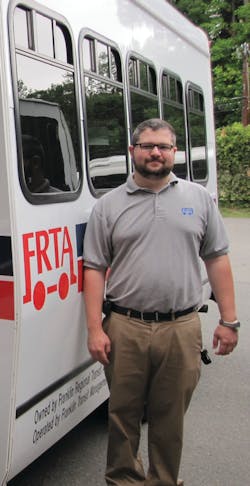Scott Willis
General Manager
Franklin Regional Transit Authority/First Transit Inc.
Scott Willis is another bright young professional in our industry who developed his passion for transit and transit management as a college undergraduate working for the campus bus system. In Willis' case, it was the University of Connecticut at Storrs. Following graduation, he was hired by First Transit as a management associate and assigned to the resident team at CTTRANSIT in Hartford where Willis performed a wide variety of assignments on transit properties throughout New England. He was then promoted to assistant general manager of the transit system in Lynchburg, Va., where he served with great distinction for four years. In early 2010, Willis was again promoted to become general manager of the Franklin Regional Transit Authority in Greenfield, Mass. There his responsibilities include both fixed-route and demand-response service throughout Franklin County, with a fleet of 33 vehicles.
Major accomplishments during his short tenure to date have included installation of an all-new fare collection system, negotiation of a new multi-year collective bargaining agreement with the union representing FRTA drivers and mechanics, staff reorganization and updating of policies and procedures. In the coming year, a major challenge will be preparing to relocate the system's downtown hub to a new intermodal center now under construction.
Willis is active in the North East Passenger Transportation Association and works closely with neighboring transit authorities in Berkshire County (Pittsfield) and the Pioneer Valley (Springfield).
“I would like to see the industry become even more useful to “riders of choice” and more environmentally friendly. Major steps have been taken in the past two decades in both arenas but more progress must be made. Green facilities to bio-fuels to hybrid and eventually electric vehicles are steps in the right direction for the environment. Of course, more ridership equals lower overall environmental impacts. More and steady government funding is required to expand transit in rural and small to mid-size urban areas. Increased span of service, frequency, reliability and real-time information are what is needed to boost ridership but, of course, all that requires increased funding.”
